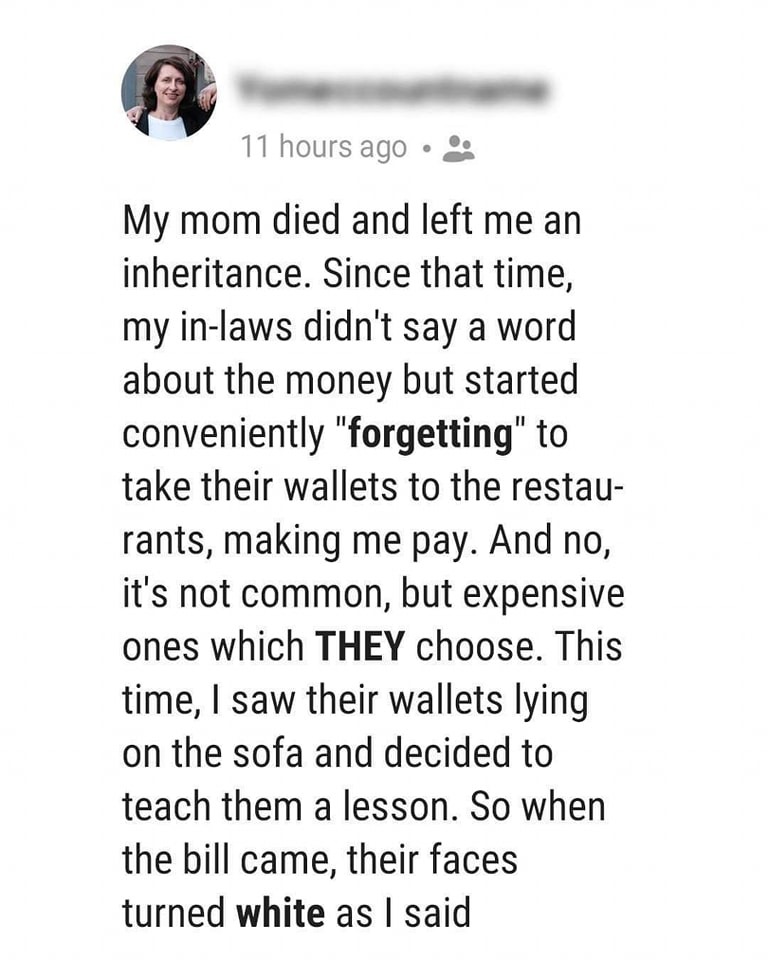My mother passed away a few months ago, and she left me a decent inheritance. It was not something I bragged about or even brought up often. In fact, I felt sadness every time I thought about it because it reminded me that my mom was gone. Despite my grief, I did my best to move on with my life and handle the money responsibly.

Ever since I received that inheritance, my in-laws have been acting strange. Normally, they would make casual conversation about everything—from the weather to family events. But suddenly, they stopped talking about money altogether, especially about my inheritance. Instead, they began inviting my husband and me to nicer restaurants, places that were fancy and expensive, which they never used to suggest.
At first, I tried to see it as a good thing. Maybe my in-laws were in a mood to celebrate or wanted to treat us to something special. But as time went on, I noticed they had a habit of “forgetting” their wallets at home. This “forgetfulness” always happened after the meal, when the check arrived. They would search through their pockets, sighing and shaking their heads, saying they could have sworn they brought their wallets. Then they would look at me with expectant faces. Since I had money from my inheritance, they seemed to assume I would simply foot the bill.
The first couple of times, I let it slide. I told myself it could be an honest mistake. But then I started to see a pattern. My in-laws would recommend a new expensive restaurant, rave about the wonderful food and atmosphere, and then, without fail, “forget” their wallets. Each time, I ended up paying for everyone. It felt rude to make a fuss at the table, and I did not want to embarrass them—or myself—in front of waiters or other diners. I also did not want to cause a scene and upset my husband.
However, their behavior bothered me more and more each time. If they truly valued me and my husband, why would they keep sticking me with the check? It felt like they were taking advantage of the fact that I had money now. My mom had worked hard her entire life, and this inheritance was a gift from her. I did not want to spend it on overpriced meals for my in-laws.
Last weekend, my husband and I visited my in-laws at their house. We were supposed to plan a family outing, and as expected, they insisted we all go to a new, pricey restaurant that had just opened downtown. This place was known for its gourmet dishes, and I knew it would be another costly evening. I also had a strong feeling they would “forget” their wallets again.
Before we left, I went to use the bathroom. On my way, I passed by their living room. I noticed both of their wallets lying on the sofa. Immediately, I had an idea. They were about to claim they forgot their wallets at home, and I had clear proof that they had them, at least before we left.
I decided then and there to teach them a lesson. I quietly took a picture of the wallets on the sofa with my phone, just in case they later said they left them somewhere else. I did not move the wallets or take them. I just wanted a record of what I saw. Then I followed everyone out the door.
At the restaurant, things went just as I expected. My in-laws raved about the menu, ordered the most expensive dishes, and didn’t hold back on desserts, appetizers, or drinks. They acted cheerful, joking around, and making it seem like a big happy family dinner.
When the bill came, my father-in-law patted his jacket pockets, then his back pockets. My mother-in-law rummaged through her purse with an overly dramatic sigh. Then they both looked at me with apologetic faces. “Oh no,” my father-in-law said. “We must have forgotten our wallets again.”
Normally, this would be the point where I would nod, reach for my wallet, and pay with a tight smile. But this time, I had a different plan. I calmly placed my napkin on the table, looked them both in the eye, and said, “That’s all right. I didn’t bring my wallet either. I guess we’re all in the same boat.”
Their faces turned white. My mother-in-law stammered, “What do you mean you didn’t bring your wallet?” She looked truly startled. Meanwhile, I saw my husband’s eyes go wide in confusion. He had no idea I had staged this.
I shrugged and replied, “I must have forgotten, just like you. I guess someone else will have to cover the bill.” The panic on their faces was priceless. They knew the restaurant would expect full payment. They also knew we could not simply leave without paying.
After a minute of awkward silence, my father-in-law finally pulled out his wallet. He had it the whole time in his jacket pocket—exactly as I expected. He tried to pretend he suddenly remembered it was there. My mother-in-law muttered something about being forgetful. My husband watched this entire scene with a mix of disbelief and surprise.
They ended up paying for the entire meal. The next day, my mother-in-law texted me, asking why I would embarrass them like that. She claimed I made them look foolish in front of everyone. I calmly responded that it was no different from what they had been doing to me—pretending to forget their wallets and making me pay. I reminded her that my money from the inheritance was not a bottomless supply for fancy dinners, and that my late mother’s gift should not be taken advantage of.
Since then, my in-laws have been quieter about inviting us to fancy restaurants. They haven’t apologized, but I feel I made my point. My husband, though initially shocked, now understands how his parents were acting. He agrees that they should not treat me like their personal bank. I feel lighter, knowing I finally stood up for myself. Sometimes, people only learn their lesson when you show them exactly how it feels to be in your shoes.
Now I have a question for you: do you think I went too far by teaching my in-laws a lesson in this way, or was it the only way to make them stop taking advantage of me?



